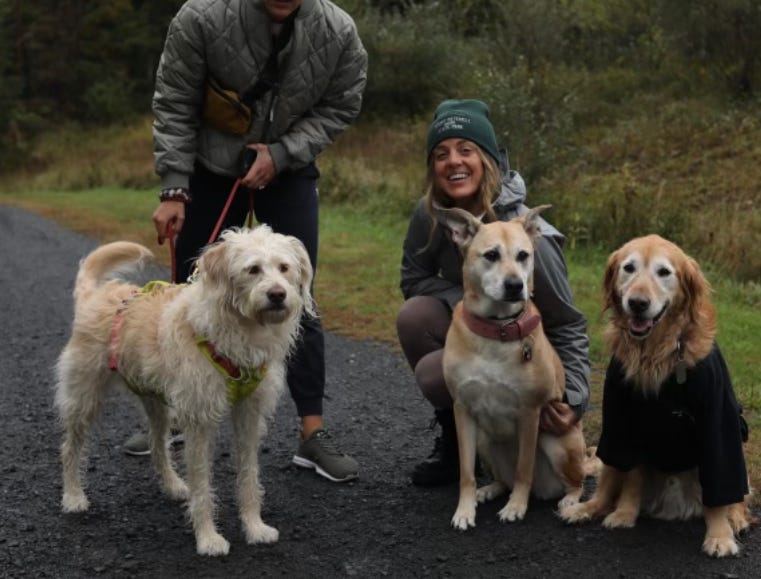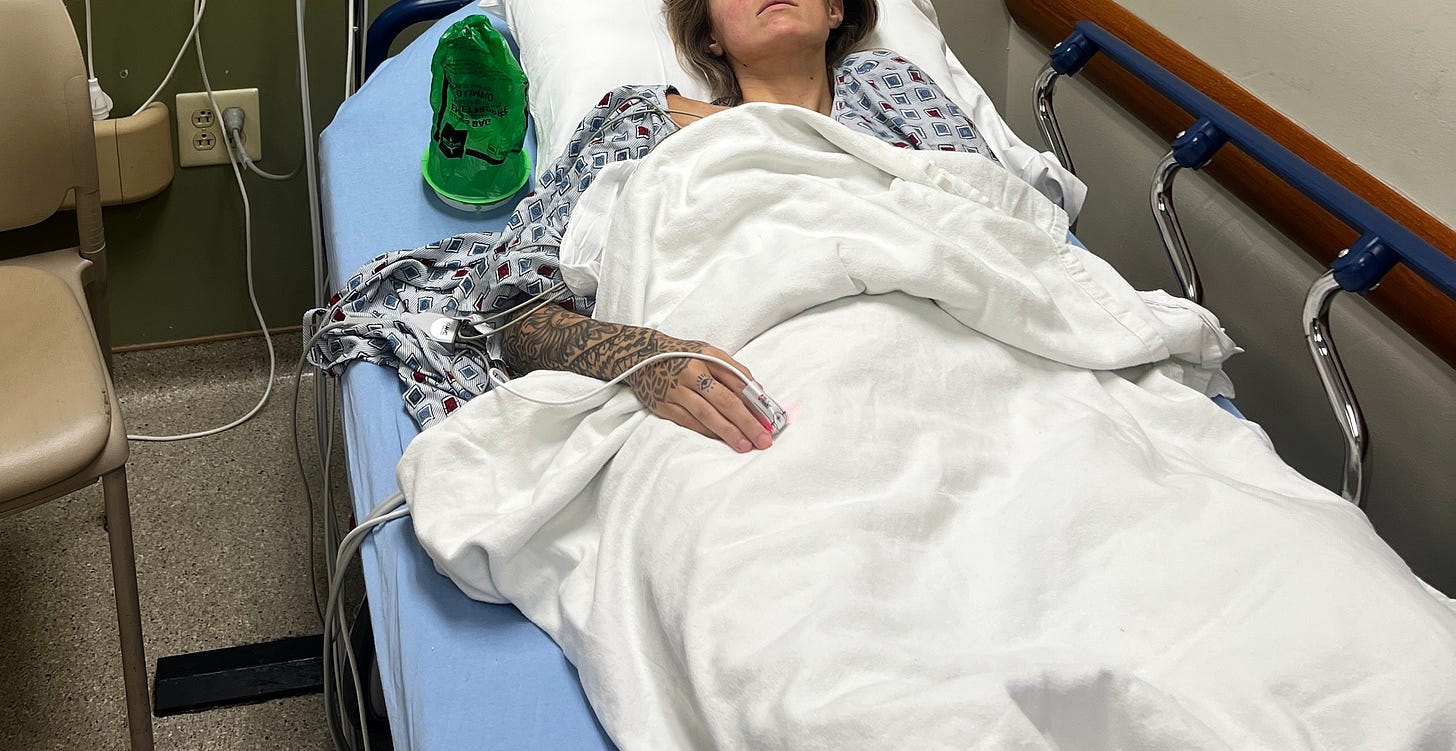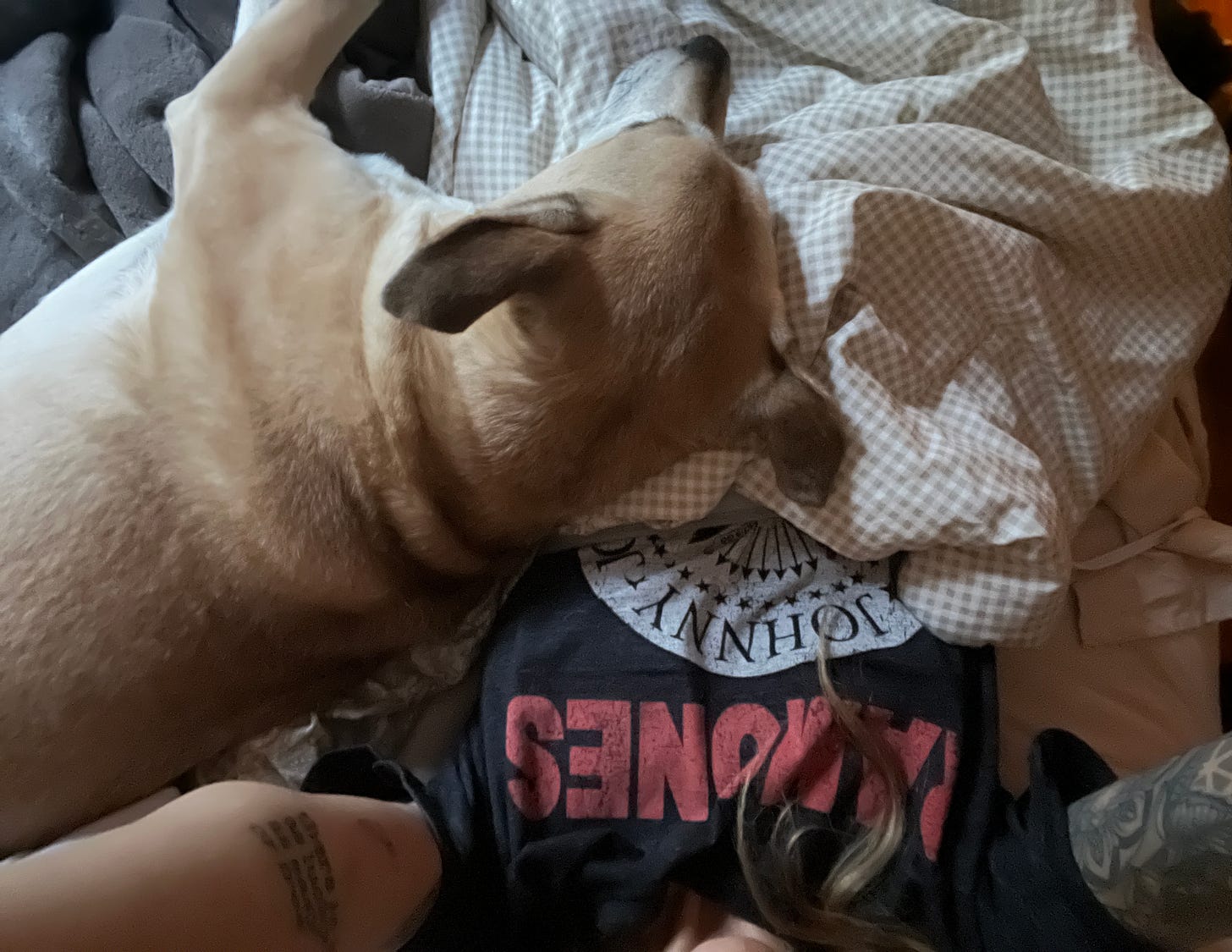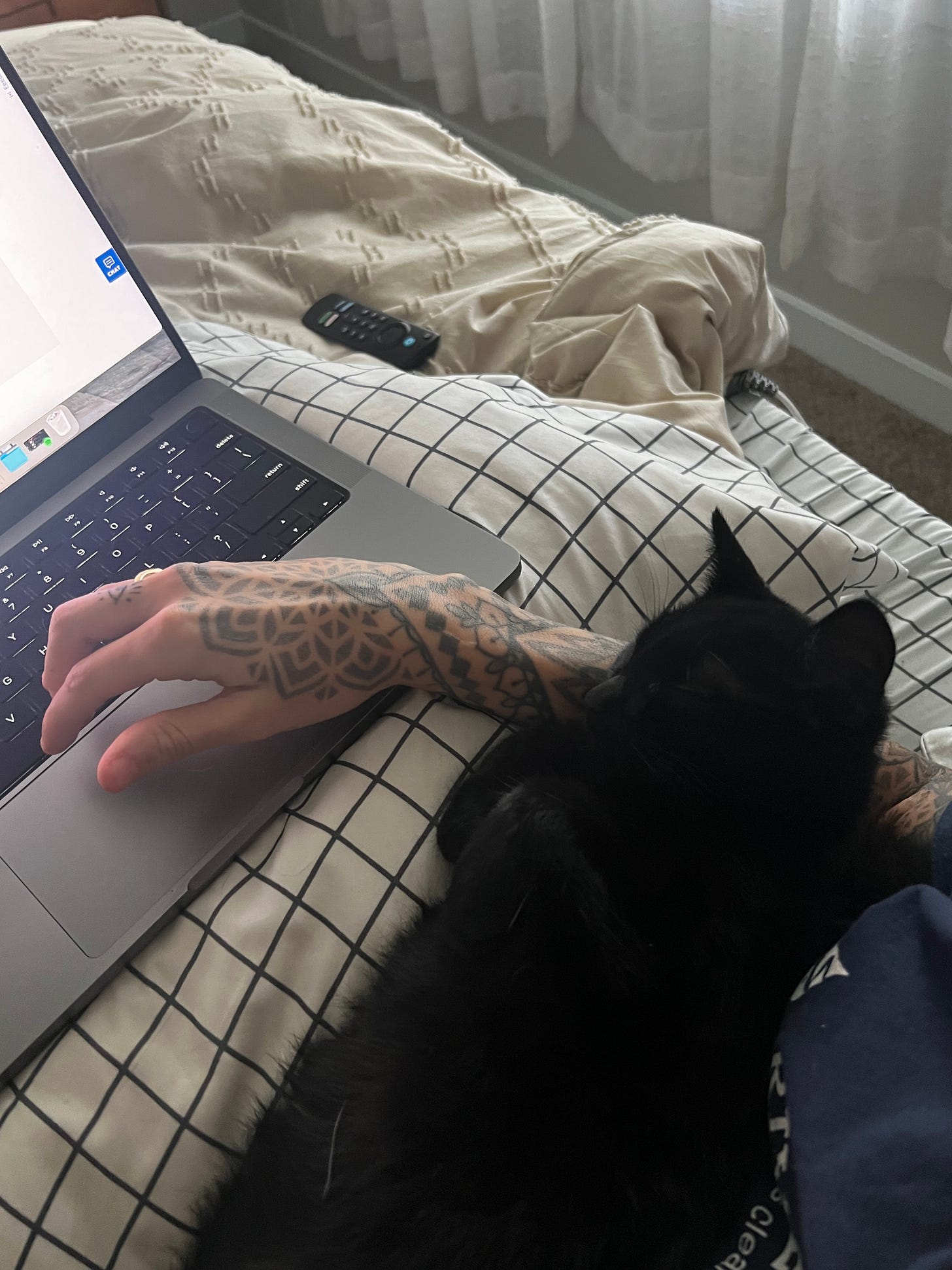If you’ve missed the last two, I’d love for you to read The Art Of Kitchen Tables and The Art of Ageism. If you enjoy reading these subscriptions, would you send to a friend? Sharing my work allows me more opportunity down the line, for both my writing and my studio practice.
I’m writing this from the passenger seat of the car as we drive the 15 hours towards upstate New York, through the dark windy roads I’ve called home for so long— to pull in just past midnight and surprise my Mom for her 60th birthday. Last evening, I pulled into my apartment complex to unload the car from our latest women’s retreat in the Blue Ridge Mountains of North Carolina. I am exhausted by the car at this point, and could use a week of sleep, but I am happy.
My business partner and best friend, Lindsey, flew in from Seattle as we prepared for our week in the woods. We drove to Asheville with a car full of groceries and hiking gear— where we met 13 strangers in a-frame cabins and spent five days hiking, cooking, eating, and remembering how to be human with one another.
*life changed, right about here, pretty quickly*
Before I could finish writing this memorable post— about the beauty and ferocity and courageousness and joy found in those moments with those women— life shifted on the drop of a dime.
It’s always a humbling reminder, isn’t it?
Eleven days ago, the day after this photo was taken, I awoke in the middle of the night with an ache— a belly pain— rolling myself out of bed carefully, doing my best not to disrupt everyone in the room and house. Those creaky wooden stairs have never been my friend, especially as a teen attempting to sneak out, but I know the exact places to step in order to avoid the wood groans. The dogs lift their heads with concern, and I give them the hand motion to stay as I creep out of the room, half bent over and gripping my side. I waddle my way to my parent's bathroom, the bathroom I grew up with, the one I am visiting for my mom's 60th birthday, and open the bottle of Tylenol before popping two into my mouth.
I must have eaten something strange, or I am still dehydrated from last week’s trip.
Abdominal pain is not new to me. I’ve suffered with it my entire life, for reasons both diagnosed and others uncertain. More on that later.
I am accustomed to breathing through the pain, re-organizing my life around it when needed. I am good at not complaining. I am good at looking like a young and healthy, pain-free girl.
So when I began vomiting, I convinced myself it was a stomach bug.
My parents awoke several hours later and found me writhing in pain on the floor, they gathered my things as they picked me up to carry me to the car, towards the hospital. But when you mention the ER there are only two things that come to mind:
I cannot go to the ER, because I don't have insurance, and I can't afford the care.
accompanied by: this is probably just a cyst or gas pain or something insurmountable, and doctors would never find anything anyway, and i’ll be left with a massive bill I cannot pay.
What I didn’t know in that moment, is that my parents’ choice saved my life.
My appendix was rupturing; it had been leaking fluid into my abdomen for maybe days or weeks, perhaps months, slowing poisoning my body.
I have done years of therapy. Years of meditation, gratitude, yoga, saunas, elimination diets. My body knows things I do not, no matter how deep I dig.
My body attacking itself is not new to me. Since I came back into my body as a 20- something, I have been battling invisible chronic illness.
Food allergies, hormonal imbalances, IBS, hashimotos disease. There is hardly anything better I know how to do, then exist happily with pain in my body.
By the time we reached the hospital, I couldn't stand up or speak. I can’t tell you what color filled the waiting room walls, what the receptionist looked like or which clothes I had sloppily thrown on. The pain was so deep and ravenous in my belly that I was forced to leave it.
Still, because of all the doctors who have denied my pain, belittled my body, my experience, blamed it on my anxiety or raised an eyebrow at the newly prescribed zoflot on my chart- I could no longer wrap my head around my own pain. It must not be real. I believed I was wasting everyone's time.
"Have you worked on managing your anxiety?"
I can already imagine the doctor murmuring over the clipboard, barely looking up from the chart as he hands me my discharge papers. Something must be wrong with me, something must be wrong with my body, with my head, I cannot tell what is real and what is not, I cannot separate what’s happening in my head and in real life.
“gaslighting is a form of emotional and psychological manipulation that involves a person attempting to coerce another person into doubting their own accurate observations, perspectives, and reality.”
I am 17 years old and preparing to graduate high school in the same tiny town in upstate New York. I began vomiting after large meals. I missed tournaments, days of school, and felt like a shell of myself. I saw my primary doctor and a few specialists, eager to solve the problem. I was a healthy kid, and had never seen the inside of a hospital. Each doctor we visited told me I was a healthy young woman who was experiencing anxiety about heading off to college and major life changes. I did not yet know what anxiety was, but I knew I must have it. I believed them.
Two years after that initial visit, they would finally find the softball-sized tumor growing in my abdomen. Two full years.
When it became impossible to keep food down, doctors were no longer able to ignore my symptoms and I was given several scans. I remember sitting up across from the doctor, so dehydrated and unwell, waiting for answers. He disregarded my presence entirely and turned towards my mom, asking if I had always been a chronic ‘nail biter’. He told us my anxiety was out of control, and it was all we could do to manage my symptoms. I remember the enraged response from my Mom, how confusing the conversation was. She then took me to see another doctor, a woman.
This story is not uncommon, but it is mine. I have met many courageous women with chronic illness, with pain, with late-stage diagnosis’— due to this form of medical gaslighting. Whether it is unconsciously inherited or blatant sexism, it runs rampant through our system, and it is killing women.
One week later, I was in an emergency 13-hour surgery, where surgeons worked to remove this tumor that was intertwined with my stomach, intestines, liver and gallbladder. Had it not been caught sooner, most of my intestines would have been removed. It was an extremely rare case, non-cancerous, but I was in ICU with a feeding tube and recovery was hell. To this day, I’m still grateful I had no idea what I was in for, the pain and trauma my body would endure. They would have had to drag me in that OR, kicking and screaming.
This was a turning point in my young life, in the way I viewed the world— the way people were supposed to protect me, to know the world is not always in your best interest— and it was not limited to my medical experiences. Up until that point, the doctor was the place you went to be heard, diagnosed, and made to feel better.
Like many women experiencing the coming of age tale, the fresh and painful distrust of the world was seeping into every corner of my life.
You learn that your word is not believed, that your body is not your own, that the world is more complex for you than it is for your brothers because it is designed to sway you from your own truth. It was a harsh reality taught and reinforced like it is everywhere else: your reality does not exist. It’s all in your head.
This reverberates and echoes through the lived experiences of many women.
Modern medicine does not only disregard women, but it does not study or advocate for women’s bodies the way it does mens. It wasn’t until the 90’s that it was required to include women’s and minorities in clinical research.
Women, young and old, are prone to be seen as exaggerating their pain, sensitive and hysterical. These stereotypes are embedded in our medical system. Medical gaslighting is a phenomenon that disproportionately affects women, particularly women of color.
Some Facts and Figures:
“A study released nearly two decades ago showed that women are systematically prescribed lower amounts of pain medication after reporting similar levels of pain compared to their male counterparts. Research confirms that when male and female patients express the same amount of pain, observers view female patients’ pain as less intense. Black women are particularly susceptible—studies as recent as 2016 showed that almost half of first- and second-year medical students believe Black patients had “thicker skin” than white patients. Women are still underrepresented in clinical research, including in cardiovascular, ischemic heart disease and heart failure trials and various cancer trials. Women are more likely to be misdiagnosed, and twice as likely as men to be given a mental health diagnosis, even when they have identical symptoms and they’re suggestive of a biological condition”
I am nowhere close to 17, but I’ll never be far from the feelings given to me in the doctor’s office that day. The shame and fear I carry for hospitals and my body being disregarded within them; apprehension holding my body stiff on the hospital bed as the doctor enters the room.
I squeeze my eyes shut, to hide the tears, because being an emotional girl has never worked in my favor.
The nurse inserts the needle carefully and I can start to breathe over the pain a bit better. They roll in the ultrasound cart and the doctor gently squeezes the cold jelly onto my bare belly, as I turn my head away from the screen. I don’t want to look at my insides and see them as strangers, to not understand what is happening as their faces twinge in concern. I don’t want history to repeat itself, for my world to come crashing down as my body is punished for crimes it did not commit. As they press in the lower quadrant of my abdomen, pain shoots out into every extremity, even as the narcotics drip.
“There is it, we’ve found the problem, and it’s not good.”
That ER doctor and Nurse Practitioner, who were at the end of their overnight shift, in the tiny mountain hospital over the ridge…. re-humanized me that morning, when they put in the order for pain meds and the ultrasound and CT Scan without questioning.
And when the CT scan found it, the nurse held my hand with a worried look and told me not to be scared.
…but I wasn’t scared.
I was relieved. Tears streamed down my face at the thought,
I was relieved to be going into emergency surgery, with the pain and terror well on the back burner…
because it meant my pain was real.
As I heal and rest, writing and sketching has been accompanying me in bed and outside as I walk and walk and walk. If you’d like to read the next portion of this piece, please consider upgrading to paid <3
This substack has big plans. But until I’m completely healed, I’ve put all work on hold. Good things are coming, I promise.
I hope you’ll read this:
Gratitude. What a simple, brief, and even over-consumed word. One that can only hold so much in what I am feeling for all of the love and support in my life today. I can attempt to express my gratitude for the community, the way you have all shown up for me in not just an emotional way, but a financial one as well. No one should have to worry about being bankrupt by a medical emergency. Our country’s systems are failing us, breaking us down, and tearing apart the communal aspect in which we need more than ever. It saddens me to think that in the moment of my deepest pain, I was essentially choosing my life over medical bills. I am working very hard to release the shame associated with communal help in this area.
To Bri, who started my GoFundMe and auctioned off her own work to help provide less pressure and anxiety over those bills, knowing I would never ask for help— it’s my wish that everyone in the world will be granted the experience of a friendship like hers— the unconditional love and true joy she brings me as a best friend.
To Luke, who sat with me for endless hours in the hospital, my advocate and protector who became my full-time care taker, and never lost his tenderness. A healing type of love.
To My Sister and Parents, who made home comfortable again and brushed my hair and washed my face and kept me laughing.
To every person who has reached out, donated, purchased my work, or shared my writing with a friend, I don’t think I’ll ever be able to explain the level of support and love I’ve felt during this very stressful time.
I vow to continue giving back to our communities in the same way you have done for me. To be of service to others and humbly remember the way strangers and loved ones have carried me through this time. I love you, thank you x
animals heal all.
On My Mind:
I just finished reading A Little Life two weeks ago, and it hasn’t left my mind since. I cannot technically recommend this book to you, because it’s chock-full of some of the most painful human experiences and triggers. BUT, I have to mention it because her storytelling is captivating, heartbreakingly moving… and I still think about the characters at least once a day.
Women made history at the VMA’s this year :)
This piece by Sez Kristiansen
Huberman podcast has been keeping me company in studio lately, and attempting to reorganize my lifestyle habits.
On the discussion of loneliness and hostility in America
My favorite banana bread recipe because I can never eat bananas fast enough for some reason, and it’s almost fall!
Lily Wong’s exhibition, Own Vortex, “The works here feel so personal, but yet strangely surreal. Wong uses this quote from Shigehisa Kuriyama in The Expressiveness of the Body as a reference: “The true structure and workings of the human body are, we casually assume, everywhere the same, a universal reality. But then we look into history, and our sense of reality wavers.”









Wishing you well. And a full and speedy recovery!